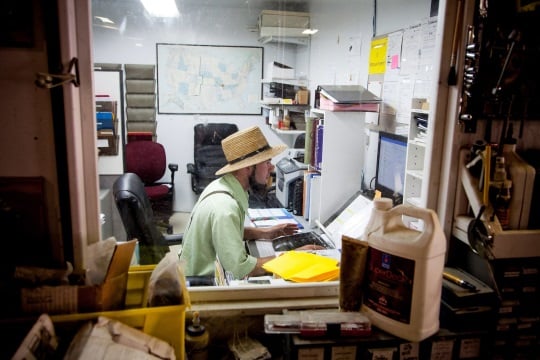NYT: “In Amish Country, The Future Is Calling”

From The New York Times (“In Amish Country, The Future Is Calling” by Kevin Granville & Ashley Gilbertson):
“Amish life is about recognizing the value of agreed-upon limits,” said Erik Wesner, an author who runs a blog, Amish America, “and the spirit of the internet cuts against the idea of limits.”
John, who works a computerized saw at Amish Country Gazebos near Lancaster, Pa., likened it to the prohibition on automobiles.
“Not using cars is a way of keeping us together,” he said. (Like most of the people interviewed for this article, he declined to give his surname, out of an Amish sense of humility; many refrained from having their faces photographed for the same reason.)
“There’s always a concern about what would lead our young folk out of the church and into the world,” John added.
The internet also threatens another Amish bonding agent: For a society in which formal education ends after eighth grade, youngsters learn a trade or craft alongside a relative or other member of the community.
“If you can just look it up on the internet, you’re not thinking,” said Levi, another woodworker. “The more people rely on technology, the more we want to sit behind a desk. But you can’t build a house sitting behind a desk.”
I like Levi’s quote here – “if you can just look it up on the internet, you’re not thinking.”
Do you ever feel like you’ve outsourced a big chunk of your brain to Google?

It’s nice to have endless facts at our fingertips. But Levi’s comments suggest what we could lose if we become too dependent on our electronic brains.
As Donald Kraybill states in the article, Amish “are more savvy about the impact of technology on human interactions than most of us are.”
I wouldn’t argue with that. Amish people probably spend a lot more time thinking about these things than the average non-Amish American does.
Unless there’s some sort of loud public issue (for example, data privacy), we seem to accept new gadgets and new versions of products with the assumption that newer and faster must mean better.

Though there are some among the Amish who like the idea of a little change:
Marylin, 18, said that when she and her friends gathered for church activities, “our youth leaders ask us to respect that we’re together and not use the phones, so we only check our messages and the time and stuff.”
But she insisted that some leniency was necessary.
“We can’t live like we did 50 years ago because so much has changed,” she said. “You can’t expect us to stay the same way. We love our way of life, but a bit of change is good.”
Maybe Marylin is typical of youth who push boundaries (or just youth in general). There are baptized Amish adults who don’t see the harm in a bit more change as well.
Even so, Amish adults typically approach this issue in terms of how it will affect future generations. As Levi adds:
“My concern for our future, for our own children,” he said, “is that they lose their work ethic.”
Read the article and view the rest of the photos here.





Congratulations...
… on making it into the big leagues! You contributed valuable insights into the dilemma of how much technology to adopt. The Amish definitely think more about this than most people.
Thanks Saloma! Yes, I think non-Amish don’t think too much about the implications, or at least not until after the fact.
OLD ORDER AMISH ANTICIPATE THE REAL FUTURE
High reliance on technology is not the ultimate real future, thank God. We students of the human condition look at the present high-technology world as a temporary artifact of burning through our fossil fuel resources as fast as possible, which has resulted in an inevitable distancing of ourselves from one another. This has caused serious rents in the human social fabric. One of the great beauties of Amish culture is that they remain close as a community, they take care of one another – one family’s problem is everyone’s problem until it can be straightened out. The world has gotten to the point where fossil fuels are getting harder and more expensive to recover. Much of the world’s technology will inevitably become more expensive and less available, particularly true of personal transportation. We are going to be forced back to relying on our neighbors again as our mobility decreases and our social and economic orientation switches back from global to local. The Amish have much to teach the rest of us about how to make that work again in the larger culture. We Englisch should be doing everything in our power to preserve the Old Order Amish culture – and to learn from it.
I have long admired the Amish for keeping most technology at bay, especially in their homes and in their own communities. But, it’s easy to see that some technology (phone shanties, gas-powered generators and refrigerators, solar lighting and battery-run machines and appliances) has been incorporated into many (if not most) Amish communities. There’s just so much (affordable) farmland left in this country. Even the Amish have to make a living somehow, if only to feed, clothe and shelter their large families. It seems that most Bishops realize this when it comes to deciding on what and how much technology to allow.
However, whenever disasters hit (like the recent hurricanes and earthquake), the thought that always comes to my mind is how the Amish would be better able to survive than most of the rest of us, with our technological “addictions.” I sure hope the Amish can somehow continue to keep (if nothing else) cell phones & the internet from interfering with their well-known and long-admired sense of community. I would hope they could be an inspiration to us “Englisch” to somehow do the same.
Alice Mary
As for the farmland question, on a related note, an article on Plain dairy farmers in Lancaster County and how milk taxation and pricing is hurting them:
http://lancasteronline.com/insider/lancaster-county-would-never-be-the-same-complaints-rise-to/article_cadc18fc-9fbf-11e7-b00b-8b3d1f158577.html
h/t Ed
I agree with Alice Mary. My grandson got married this weekend and the pastor used his I phone to read his sermon and the Scripture. It was bad enough when phones went off during the worship service at work and the teenagers spent the entire time texting, but the pastor juggling his phone, the rings and the microphone during a wedding was the ultimate insult for me.
When my family visits they have their noses in their phones and text in the middle of conversations. Oh for the time of community and respect. So sad.
Debbie I think western culture has gotten increasingly informal especially in recent years, but using an iPhone to read Scripture seems especially casual for a wedding ceremony. Sorry to hear it took away from the special day.
I totally agree about things becoming increasingly casual in recent years. One Sunday, a few weeks ago, I visited a church with one of my friends. I was surprised to see so many people very casually dressed. Even the pastor of the church was wearing jeans!! I’m pretty sure my mother would turn-over in her grave!!!
I notice that the dress and apron worn by the girl in the first photo are patterned, which isn’t common in Amish clothing. I think I’ve seen this practice in one or two other pictures, which, like this one, appeared to be from Lancaster or a daughter settlement. Maybe it’s tolerated because the patterns are straight lines, rather than the floral designs seen on the dresses of Mennonite women, like that of the woman in the background of the photo. It could also be more tolerated among teenage girls, especially if they haven’t yet joined the church.
Yes you do tend to see that light pattern among younger girls, at least in this community. I don’t recall seeing floral patterns. Some boys in Lancaster will also wear light patterned shirts as well.
Internet is not always bad
I must disagree with that gentleman about the internet but only briefly. Recently I learned to crochet. I’ve made a few blankets using a simple chain stitch. Time to learn to make granny squares. I watched several videos, found the person who reasonated well with me. After a week I now have 11 pairs of granny squares. And another video taught me how to make the off white border I wanted. Okay that was a cinch…but I didn’t know until I saw the video. Thank you YouTube.
Internet is not always bad if you are seeking out worthwhile projects. But if you are online chatting, wasting time and not being productive…yes, I agree.
Good points Margaret. Like anything it’s in how you use it. There are a lot of distractions easily available online though. I know from experience it’s easy to burn a lot of time online (hello Wikipedia 🙂 ).
Majoring in Minors
I tend to agree with much of what is said about the way we have sold our minds and souls to technology, but I want to comment on Erik’s statement at the beginning of the article; “Amish life is about recognizing the value of agreed-upon limits,”
Being Amish is about a devotion to the Lordship of Jesus Christ and faithfulness to the Community of Believers. It is not about “agreed-upon limits. The world likes to talk and write about the Amish,and yet rarely do we focus on their faith. We focus on the peculiarity of Amish rules and limitations, the minor matters of colors,the means of getting about, etc. I have spent my life observing the way people are fascinated by Shaker furniture and articles of Shaker material, ignoring the deep spiritual devotion to the Christ Spirit. People would rather focus on the minutia of people of faith rather on what they are “about.” Limits are about the “how” of living in community. Faith is about the “why” of that living.
If you want to look something up, check out Menno Simons or Jakob
Ammann. Read beyond the NYT or Wikopedia.
Thanks John, I’d agree. There are numerous things Amish life could be said to be “about”, since it’s a vague formulation. In the context of a relatively brief article focusing on technology my statement is relevant. But you are right that Christian faith is the foundation or rather should be, and to fully appreciate that, those curious would do well to study the topic in greater depth. Thanks for your thoughtful comment.
Jesus's dress code
Lots of people devote their lives to Christ and don’t ride in buggies or shirk electricity. The Amish do. The community is religious, and “being in the world, not of the world” seems to be a defining factor, but in fact, the varying amish groups do “allow” certain technologies, fabrics, styles, colors, practices, etc, and the members conform to what is allowed or not allowed, and in no sense at all do any of those rules have anything to do with the laws of Jesus, except not being of the world, but in fact, horses, propane stoves, wells, solar panels, lamps, fabrics, ingredients, etc, are all worldly in a sense and aid in everyday life to the Amish living in the world God created. If zero technology was allowed, they could be wearing hand woven clothes knitted with sticks from cotton they grew themselves and would ride bareback on horses. In fact they allow quite a bit of technology but seem to stay in the 1800s in fashion and transportation but even more modern in other aspects. The best thing about the Amish to me is not watching tv or using electricity, but I can see from my limited perspective they do seem to enjoy “allowed” technology though I hope they keep it to a minimum and never allow tv and electricity as a rule. They are also “allowed” to go barefoot and seem to really love that. In my life I have had to compromise my personal values in order to survive. I wish I haven’t. I think all of us could live in a much kinder, healthier world and we need help to do so.
Really?
I often ask myself, why aren’t the bishops getting into this? I thought the whole idea was to be separate from the world, and cell phones connect and maybe even locate where the owner is, at all times. I don’t have one, and I live in Silicon Valley!
Fears for the future
Recently 4 young men left the Swartzentruber Amish community, all within a few days of each other. While one or two have run off together in the past, the only other time something like this happened was when two families joined a local conservative Mennonite church–and that was not without warning. It seems smart phones–and the possibility they offer young people to “link up”– have hit the local settlement hard.
Karen, do you have any idea how prevalent smart phones among youth might be in the Swartzentruber communities you follow?
Maybe that is hard to know, but I’m wondering how usage in those communities would compare to say Lancaster youth.
I would guess it would be lower among Swartzentruber youth, but don’t want to assume that because maybe it is even more enticing to acquire a smartphone in a more restrictive affiliation (though I’d imagine they’d have to be a lot more secretive about how they’d use them compared to Lancaster youth).
I liked the article, but do not believe it relates to anything new in the Amish experience. The Amish have always had used technology on the edges. The article mentions that one Amish man uses a computer for cutting, another uses a phone for work related calls. I’ve been to Amish areas for 2 decades, and I already saw phone then. I already knew some used computers and phones for work.
If you go back before the use of phones, Amish still adopted technology for work. Many had phone booths at the end of the road or had people driving them to bus stations or markets in Lancaster. So it sounds to me like the Amish haven’t really changed anything. Its just that now, some are finally recognizing the Hollywood stereotypes don’t exactly always fit to reality.
You are right that Amish using technology is nothing new, albeit at a different pace, not in full, or with modifications on the device/how it’s used (restrictions on tractors for instance, like requiring steel wheels or banning them from field work). This is in contrast to the notion that the Amish are “frozen in time”.
But today’s smartphone and internet are different from other earlier technologies like a landline phone or PCs which did not have internet access (or tapped into a much more primitive and limited internet), for reasons including the access the net provides to a vast amount of information (including immoral content), its addictive nature, and since the internet/smartphone can even change the way we think and act (woodworker Levi’s quote in the article about reliance on the internet damaging our ability to think and create, suggests this).
And in the case of the smartphone, it presents an additional challenge as it can be easily hidden (in contrast to say, an automobile or other difficult-to-conceal technology). So I think these technologies are viewed as more threatening for these reasons among others.
I used to have everything...
I used to have a beeper when they first came out, then I got a cell phone, then I got a tablet, and I have had a computer since 1984. I gave everything up except my laptop and a land line phone (not texting). No texts, no calls from work at 11pm, no emails that alert me the minute they come in – nothing that requires an immediate response from me. I’m not sure – but I think that CS Lewis said telephones are an abomination. Ring, ring, ring, no manners as to what you are reading or working or doing at the moment. They demand our attention without regards to our lives.
On the other hand – I have learned so much from the internet – from learning to speak PA Dutch, to physics, to politics, to the Amish on this site. And without leaving the comfort of my home office. But there is nothing I have learned with gadgets, that I couldn’t have learned at the Library.
My life’s happiness level went up full throttle when I gave up my cell phone. And a smart phone for Amish – I think is completely useless and could lead the entire Amish community down the wrong path.
You see – they are no longer separate. The internet’s very purpose is to unite. Unite knowledge, communication, advertising, propaganda, it can influence democracy, manipulate our very elections. The internet is like TV on steroids if not used correctly.
If I were a bishop – I would allow only the cell phones that one could use to call 911 and that’s it. I would ban all smart phones – if a business is on the internet – then the owners could go to the Library every couple of days to check on their email. But to use it every day – surf, look up stuff just because it’s quick, call your friends instead of visiting them – it’s worse than just a phone in your house.
I am super liberal – but I feel technology used by the young Amish will definitely destroy the Amish Communities. It is a luxury that is more dangerous than they realize. It is more dangerous than quitting school at the 8th grade (Yes, I believe the Amish should be able to continue their education – and bring back what they learned to their communities. Be Amish doctors, Amish lawyers, Amish writers – expand their job opportunities AND help their communities.) But you don’t need a smart phone to get a degree in anything. Just a good education and great teachers.
Be wary of technology. It could be that we are too far in the future techno-wise for our morality. Family is far more important than a text, jobs will still be there on Monday morning, a visit is far more meaningful than a ring on a phone that disturbs you in the middle of whatever you are doing – maybe even praying.
Just my humble two cents on the issue.